Ofcom UK Publish 5G Auction Rules for 700MHz and 3.6-3.8GHz
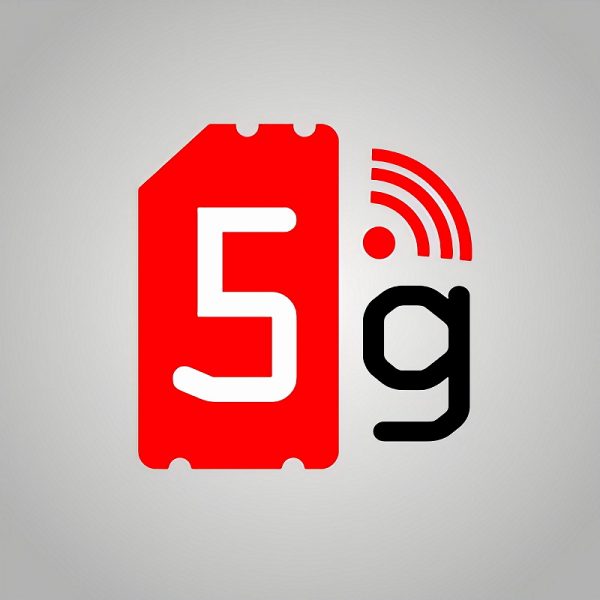
The UK telecoms regulator has today finalised their rules for this year’s forthcoming auction of the 700MHz and 3.6-3.8GHz radio spectrum bands, which hopes to boost new 5G mobile network coverage and mobile broadband speeds further into the Gigabit-capable (1000Mbps+) territory.
At this point our readers may recall that Ofcom originally intended to impose a complicated legal coverage obligation on the 700MHz band, although that has since been replaced by the new £1bn industry led Shared Rural Network (SRN). The SNR includes the targeted sharing of existing masts and new masts in poorly served areas, which aims to extend UK 4G geographic coverage to 95% by the end of 2025.
In relation to the SRN, the four mobile network operators – EE (BT), Vodafone, Three UK and O2 – have also agreed for Ofcom to vary their spectrum licences to give effect to the coverage commitments. “We will also monitor, and report, on their progress in meeting the new commitments,” said the regulator (fines worth up to 10% of an operator’s gross revenue could be imposed if operators fail to meet their targets).
Advertisement
Back to the auction. Overall the regulator intends (see the final rules) to auction off 80MHz of spectrum frequency in the 700MHz band and 120MHz of spectrum in 3.6-3.8GHz band. The combination of these two will increase the total amount of airwaves available for mobile in the UK by nearly a fifth (18%).
Philip Marnick, Spectrum Group Director at Ofcom, said:
“Demand for getting online, on the move is soaring, with mobile customers using nearly 40% more data year on year. So releasing these airwaves will bring a much-needed capacity boost – helping mobile customers get a better service.
We’re also releasing more airwaves to help cement the UK’s place as a world leader in 5G.”
As expected the regulator still plans to impose a 37% (416MHz) cap on the overall spectrum that any one mobile company can hold following the auction. The cap effectively limits the spectrum that some operators can acquire in the award. In other words, BT will be limited to acquiring up to 120MHz, while Three UK can only acquire 185MHz, Vodafone may only grab 190MHz and no limits will be imposed upon O2 due to their current holdings.
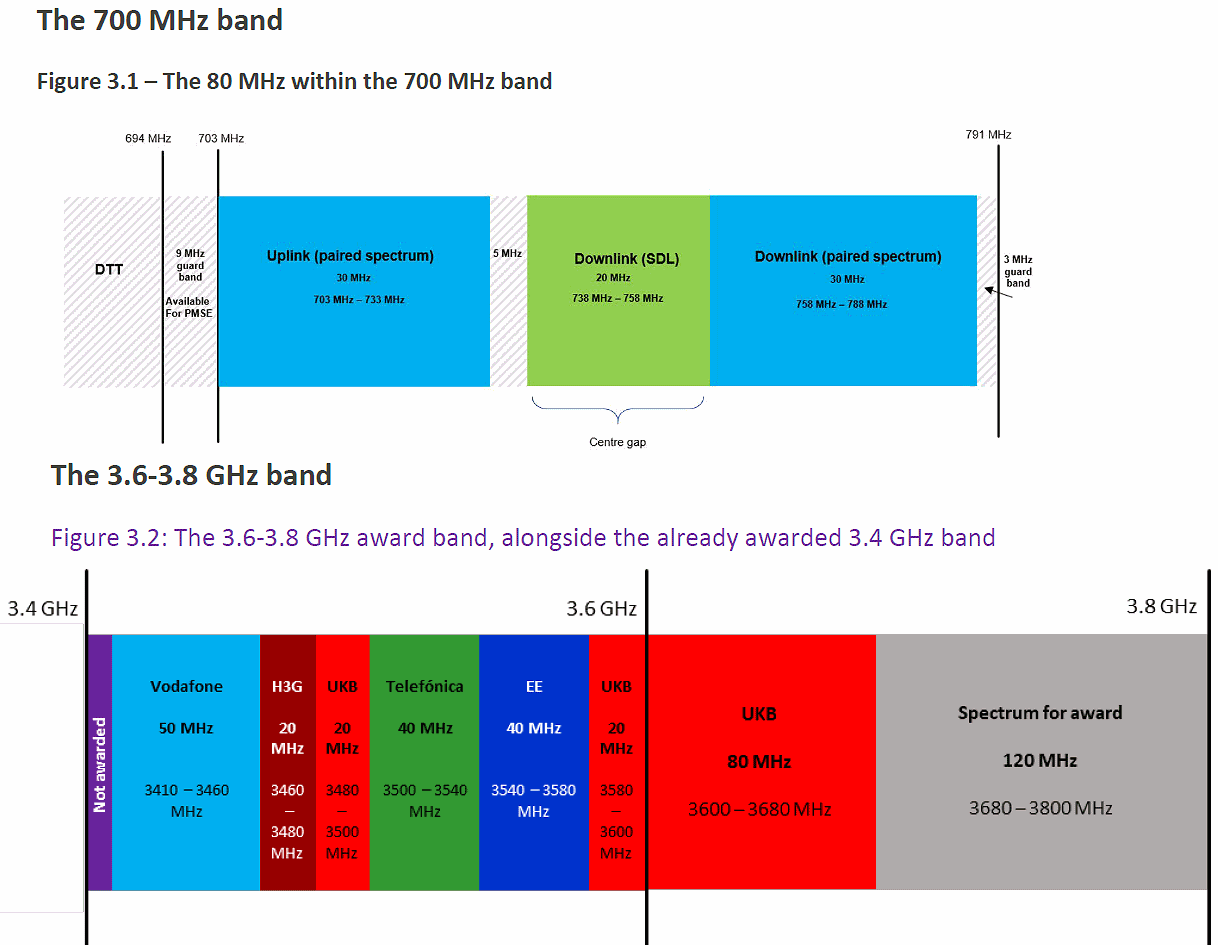
Obviously the final outcome will ultimately depend upon who bids for what but more spectrum tends to equal better mobile broadband speed and that’s going to be key for 5G. At present EE, Vodafone and O2 only have access to a 40MHz, 50MHz and 40MHz slice – respectively – of the 3.4GHz mobile band for their 5G services.
Advertisement
By comparison Three UK only won 20MHz of the 3.4GHz band, but due to existing holdings they have a total of about 140MHz (frequency) across several related radio spectrum bands (see above). One of those includes a 100MHz block of contiguous spectrum in the 3.4-3.8GHz band (here), which is known to be the sweet spot for 5G performance.
Otherwise the auction itself, which will get underway shortly (spring), involves the same two stages as previously announced.
Principal stage. Companies first bid for airwaves in separate ‘lots’ to determine how much spectrum each company wins.
Assignment stage. Then there is a round of bidding to determine the specific frequencies that winning bidders will be allocated.
Bidding Lots
The spectrum will be made available for bids in the following lots:
A. Six lots of 2 x 5MHz (60 MHz in total) in the 700 MHz band, with a reserve price of £100m per lot.
B. Four lots of 5MHz (20 MHz in total) of 700 MHz downlink-only spectrum, with a reserve price of £1m per lot.
C. 24 lots of 5MHz (120 MHz in total) of 3.6-3.8 GHz spectrum, with a reserve price of £20m per lot.
The goal of the assignment stage is largely to make it easier for operators to create larger contiguous blocks of spectrum in the same band, like the 100MHz block that Three UK already enjoys. Winners of 3.6-3.8GHz spectrum will thus have an opportunity to negotiate their placements within the band among themselves. “This will make it more straightforward for bidders to join together the new spectrum they win with their existing holdings, and potentially reduce the level of ‘fragmentation’ in the wider 3.4-3.8 GHz band,” said Ofcom last year.
Finally, Ofcom noted that the 700MHz band would officially become available for mobile use by 1st May 2020, subject to the Digital TV clearance work completing on schedule. Meanwhile operators will similarly be able to use the 3.6-3.8GHz band(s) by June 2020, although it’s noted that “some localised constraints may remain in place until the end of 2022.”
Advertisement
See the table below for some context of existing spectrum holdings by UK mobile operators.
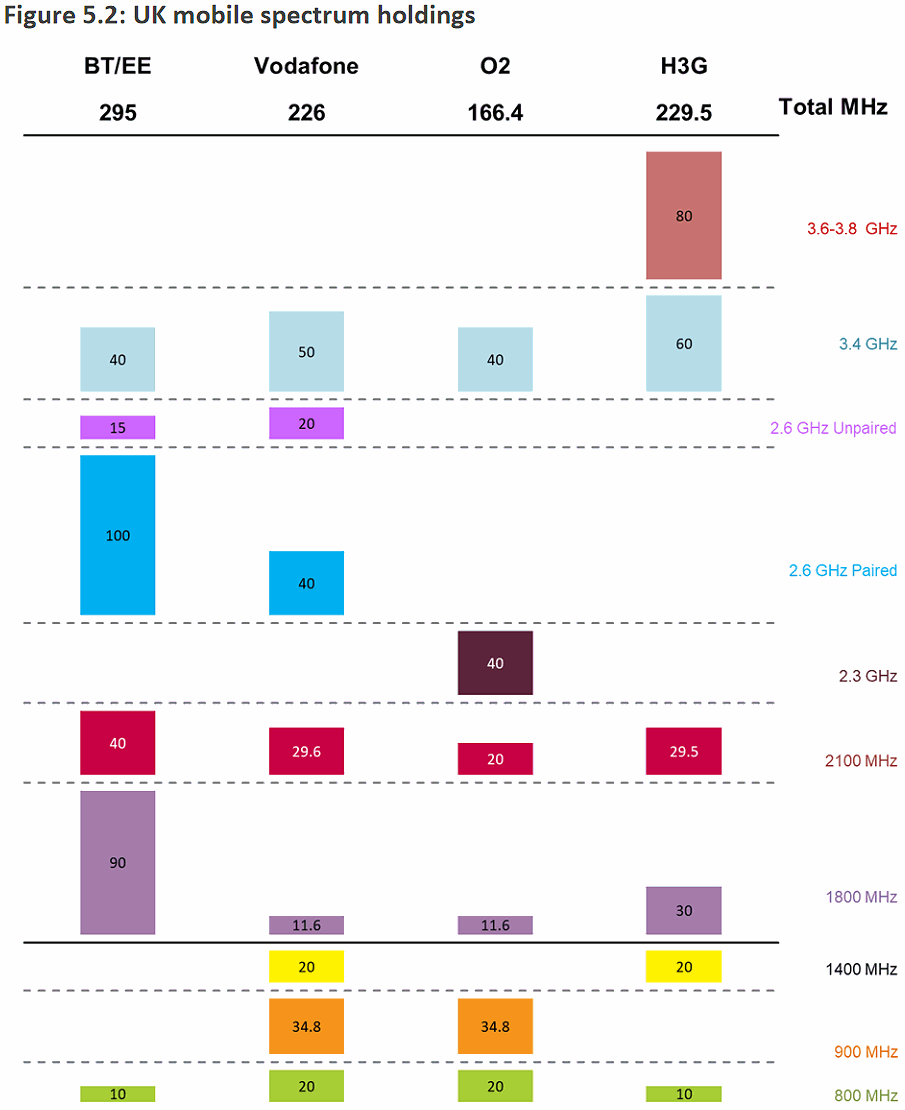
In addition, Ofcom has also posted a useful table, which predicts when some new and existing spectrum bands might become available for use by 5G services in the future. However, mobile operators said they won’t leap to refarm their existing 3G and 4G spectrum bands for 5G, at least not until the latter has achieved much better coverage and take-up (e.g. Vodafone said they’d focus upon 3.4-3.8 GHz as the main 5G band until perhaps 2024).
We should add that the regulator intends to auction off more bands for 5G in the future.
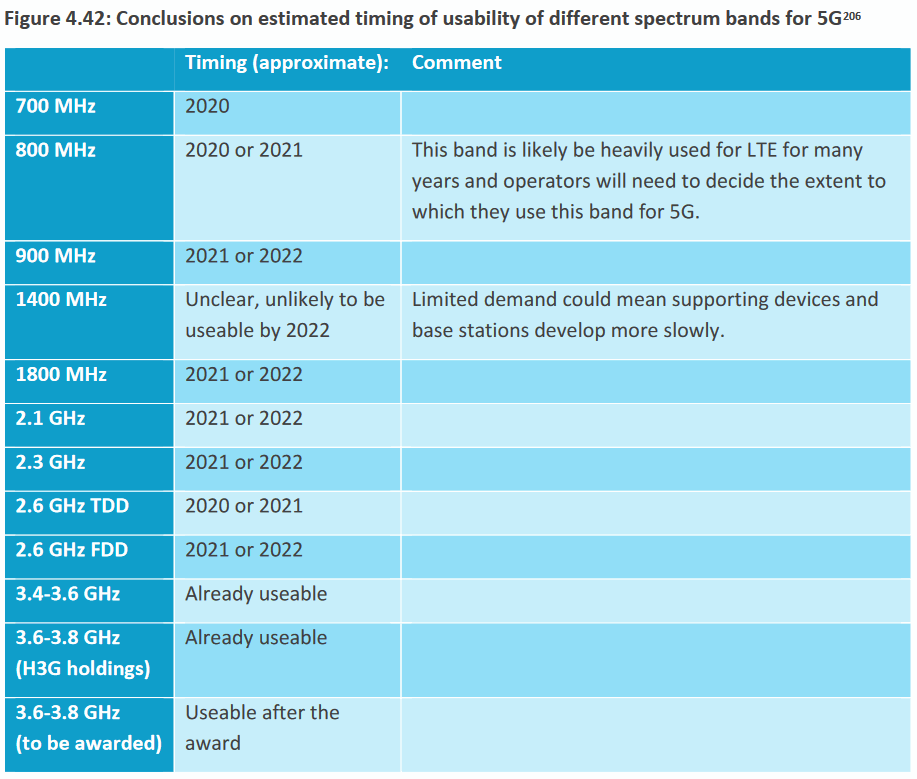
UPDATE 11:29am
We’ve had a comment from O2.
A Spokesperson for O2 said:
“A successful 5G auction will be the catalyst for productivity gains, increases in innovation and could enable the UK to develop a secure and competitive edge in a post Brexit world. Ofcom’s failure to include adequate measures to provide for spectrum defragmentation in the 3.4 GHz – 3.8 GHz band derails the government’s 5G ambitions, undermines their plans to encourage diversification of the 5G supply chain and puts at risk the UK’s competitive position as a leading digital economy.”
Mark is a professional technology writer, IT consultant and computer engineer from Dorset (England), he also founded ISPreview in 1999 and enjoys analysing the latest telecoms and broadband developments. Find me on X (Twitter), Mastodon, Facebook, BlueSky, Threads.net and Linkedin.
« Super Spreader Fears as COVID-19 Hits BT UK CEO Philip Jansen
Cityfibre Trials Aim to Improve Safety for UK FTTH Builders »










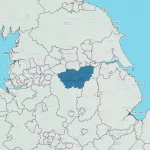
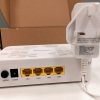










































Lets say a MNO has 10Mhz of paired (FDD) 700Mhz. What is the upload and download capacity per cell?
If I have my calculations correct this is 112Mbps (256QAM) download and 90Mbps (64QAM) upload (with 2×2 MIMO). So the dream of 1Gbps is not possible on 700Mhz!
As they add Carrier Aggregation, 4×4 MIMO and SDL then speeds will increase… at loss of coverage as frequency increases. But still most will be a long way off Gbit speeds that 5G is hyped to offer.
Yes in rural areas I can’t see 1Gbps being at all realistic until several of the other bands are able to do CA on 5G too, even then it will be difficult and the usual coverage caveats apply.
The 700mhz 5g band is for long range (not speed) for fall back when 3.5ghz 5g is not available
This could put low band 5g at slower speeds then what you get on 4g if they don’t buy enough 700mhz slots but does give the advantage that you have a signal in more places
unknown about 5g VoLTE if that even works on the second generation phones that use the 865 chip that has all the radios in one chip (the first gen 4g phones used a off chip only 5g modem and had to drop to 4g/3g to allow call)
You can give 1000MHz to Three and they will be still the slowest network due to poor core network infrastructure and coverage.
That’s precisely true. Three will always be Three, but they are the cheapest by far to offer unlimited data in the range of £16-18. I can only see EE’s network being the fastest, especially when they easily offer 100+Mbps on their 4G network.
I can’t see the way the available spectrum being sliced up is viable for so many telco’s, they should be bidding on 100mhz blocks, not piddling little 5mhz ones. Can’t the government see that the spectrum they are offering is too small to make 5g even viable nationwide, let alone in large cities?